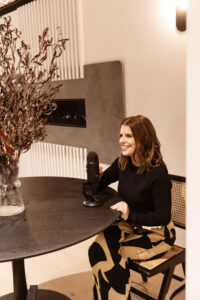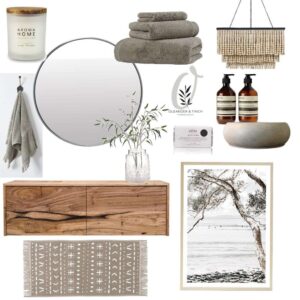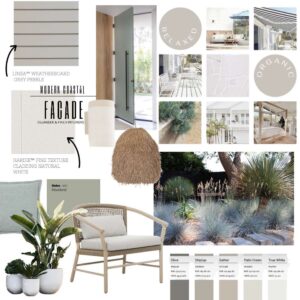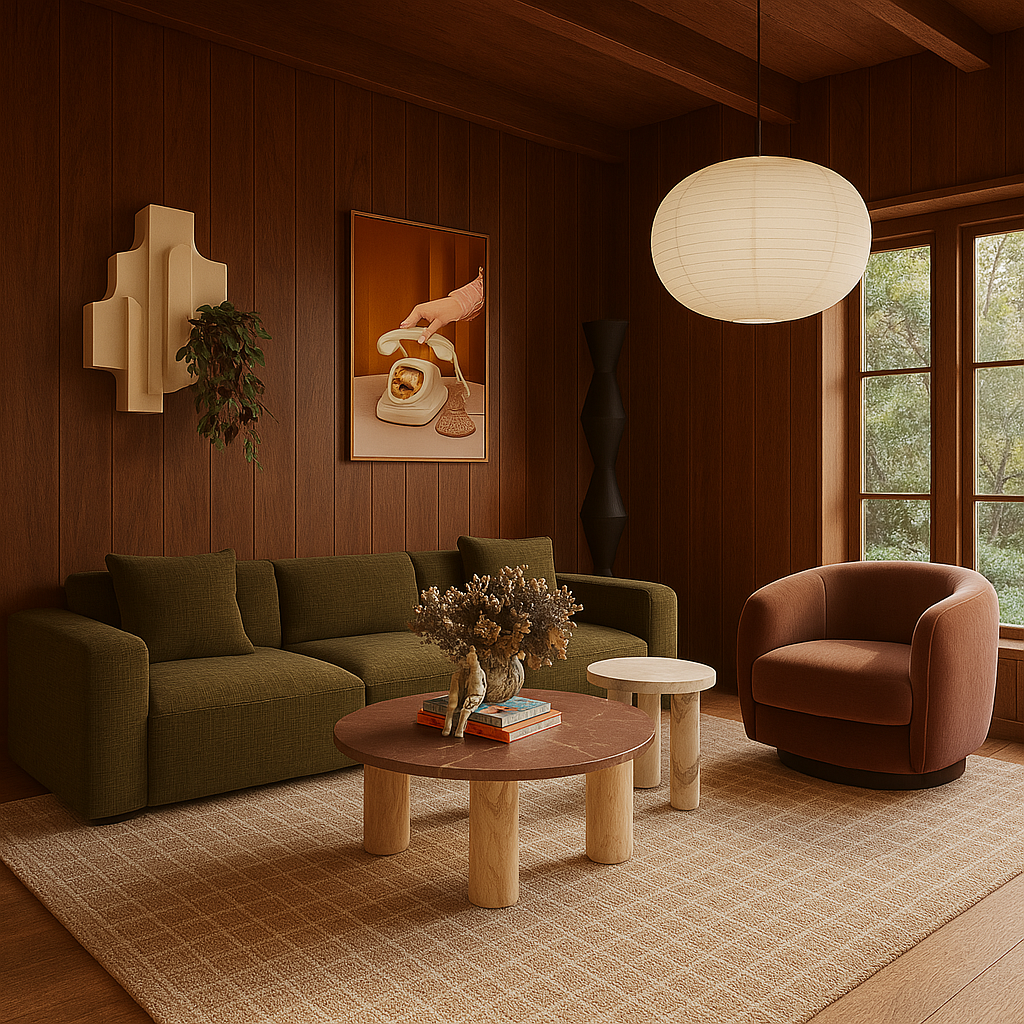In an industry built on intuition, aesthetics and human connection, the rise of AI might seem like a threat. However, it can be a power tool for transformation that enhances creativity rather than undermines it. At Decor + Design & The Australian International Furniture Fair (AIFF) 2025, we’ll be shining a light on the power of AI for designers at the Seminar Series, with a session from Rhiannon Lee, founder of Oleander and Finch on Friday 18th July.
 An early adopter of AI, Rhiannon (left) has harnessed its power in both her design work and how she runs her entire business. It has helped her evolve what began as a side hustle into a thriving interior design studio, a sought-after coaching platform and a podcast that is redefining what success looks like in the design world. Her fearless embrace of change has helped her become one of the design industry’s leading voices on AI.
An early adopter of AI, Rhiannon (left) has harnessed its power in both her design work and how she runs her entire business. It has helped her evolve what began as a side hustle into a thriving interior design studio, a sought-after coaching platform and a podcast that is redefining what success looks like in the design world. Her fearless embrace of change has helped her become one of the design industry’s leading voices on AI.
Ahead of her session at Decor + Design 2025, we talked to Rhiannon about her journey, the tech that’s changing the game, and how designers can future-proof their studios without sacrificing soul.
Rhiannon, how did you get into the design industry? What inspired you to start Oleander and Finch?
Honestly, I fell into it. I never set out to launch a design studio. At the time, I had very young kids and had just lost my job due to COVID. Design was something I’d been doing on the side, just one or two clients here and there, but with everything on pause, I thought, “Why not go all in?”
I knew I had business and marketing experience from my corporate career, so I ripped off the band-aid and backed myself. It started as a lockdown experiment, and it took off. What began as a side hustle quickly grew into a booked-out studio with a 12-week waitlist. It wasn’t the plan, but it was the right move.
How has your business evolved since its early days?
My current business model looks nothing like the version of me that first launched Oleander and Finch. Back then, it was just me, figuring things out one step at a time. Now, I run multiple group programs and memberships, I support both emerging and established designers, and offer private coaching.. as well as my podcast Designing Success, which is something I never would’ve had the bravery to launch in those early days.
I still take on one paid design client at a time by choice. It keeps me creatively grounded and helps me stay in touch with what my clients are actually facing.
One of the biggest shifts has been around tech. In the beginning, I avoided systems and automation completely. I didn’t feel confident in that space at all. But over the past couple of years, I’ve leaned into learning AI, and now it’s one of my favourite parts of the business.
This isn’t just a different business, it’s a different version of me. I’ve grown into a more confident leader and shaped a business that actually works for my life.
You’ve become a leading voice in the conversation around AI and interior design in Australia. What first sparked your interest in this space?
I started experimenting with AI before it was really on anyone’s radar. In early 2022, I was using Jasper for copywriting, but because no one was talking about it yet, I’d often forget to use it.
When ChatGPT launched later that year, suddenly the conversation exploded. I already knew the potential, so I didn’t hesitate. I wasn’t trying to replace creativity, I just saw an opportunity to reclaim time. I wanted something that could take admin, captions, and the repetitive day-to-day off my plate so I could focus on work I actually enjoy.
From there, I went deep into the tech. I started building custom GPTs and testing how far I could push their capabilities. Now I save at least 25 hours a week using my own AI tools, and the possibilities are growing by the day. Floor plan analysis, photorealistic renders—tools that actually help me do better creative work, not less of it.
 For designers who feel overwhelmed or intimidated by AI, where do you recommend starting?
For designers who feel overwhelmed or intimidated by AI, where do you recommend starting?
I always suggest a two-pronged approach. First, realise you’re probably already using AI without realising it. It’s embedded in tools like Canva, Notion, and even some trade platforms.
Second, don’t try to master everything. Pick one tool, like ChatGPT, Gemini, or Claude, and just start. Watch tutorials, join a class, or invest in a course. Treat it like you would any other software you’ve had to learn in your business.
And most importantly, understand that you have to make time to save time. You won’t be great at it on day one. You’ll fumble, the prompts won’t work, and that’s normal. But if you keep showing up, you’ll get better. Eventually, it becomes second nature.
What are some of the most exciting practical ways AI is currently being used in design studios? How do you personally use AI in your own business?
One of the most exciting uses right now is photorealistic image generation. It’s not something you’d build from, but it’s an amazing way to help clients visualise concepts quickly and clearly. For people who struggle with spatial or creative thinking, this tool helps me articulate my skill so that they have a stronger understanding of the vision.
In my business, AI is part of everything. I’ve built a team of custom GPTs that run behind the scenes. I have a virtual boardroom, an Instagram caption writer, a keyword and SEO assistant, a productivity auditor, and someone who handles email replies.
If I were paying humans to do what these tools do, it would cost me around $1.5 million in wages. Instead, they work with me 24/7. These tools let me scale, stay creative, and focus on high-impact work so that I can support my students and show up with my design clients without breaking a sweat.
How do you balance the tech side of your work with the creative, emotional side of design? Do you think there is a conflict?
If you rely on AI for everything, yes, it can flatten the emotional or artistic side of design. But I don’t start with AI. I start with creativity. I build concepts, mood boards, and material palettes in the studio, and then I use AI to support the vision.
Maybe that’s a render to help a client visualise the idea, or summarising a long client conversation into a neat, usable brief. Why spend hours writing reports if a tool can do the heavy lifting and let me stay focused on the design itself?
AI helps me stay connected to the client’s story. That’s what makes a project feel human. If used well, it doesn’t take away from creativity, it makes more space for it.
What do you think design studios need to focus on most in the next five years to stay relevant?
Adaptability, skill development, and progress. The studios that will thrive are the ones who stop resisting change and start working with it.
working with it.
AI is already here, baked into tools we use every day. It’s not going away. And saying “I prefer to hand-draw” won’t slow down the studios who are scaling faster and working smarter with AI.
That doesn’t mean giving up on creativity all together, it means protecting it. The studios that treat AI as a support system, not a threat, are the ones that will stay relevant, profitable, and creatively fulfilled.
You’ll be delivering a seminar at Decor + Design 2025 on Friday 18th July on activating the power of AI in design. What takeaways will attendees receive?
I want this session to leave designers feeling genuinely empowered. We’ll start by clearing up some of the biggest fears and misconceptions about AI, because I know that’s what holds most people back. Then we’ll dive into the practical side, how AI can streamline your studio workflows, save you hours each week, and support your business behind the scenes.
I’ll show real-world examples of how AI tools like photorealistic renders and custom GPTs can act like junior assistants, freeing up time for the creative work that truly matters.
But most of all, we need to normalise the use of technology in our industry. We can’t keep saying things like “I don’t use ChatGPT” or “I do everything manually” as if that’s a flex. That mindset is keeping people stuck. We need to shift toward adopting the technology before it takes you over.
This is about building confidence, not perfection. I want you to walk out informed, confident, inspired, and ready to stay ahead of the curve.
Don’t miss Rhiannon’s seminar on Friday 18th July at 12.30pm. Tickets are $65. Book now to reserve your place in what is sure to be a popular seminar!
